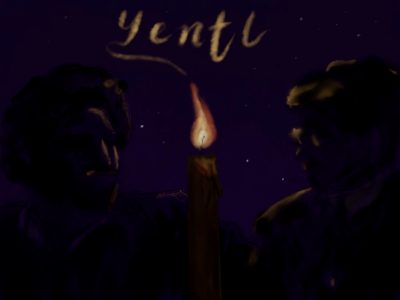If you’re not a musical nerd, Streisand fan or gay (à la Man in chair in “The Drowsy Chaperone”), you may be asking, “What is a Yentl?”
While I cannot relate, I can answer your question, as I am all of the above.

“Yentl” is Barbra Streisand’s criminally underrated 1983 directorial film debut set in turn-of-the-20th-century Poland. After her father (or “Papa”) dies, Yentl, the titular character played by Babs, decides to disguise herself as a man to study Talmudic law at a Jewish school called a Yeshiva. At school, she meets the ambitious Avigdor, who is in love with Hadass, a local girl. During the film, the three enter a love triangle complicated by Yentl’s gender secret.
Oh, and it’s a musical. What, you didn’t think Barbra would co-write a film without throwing in some showtunes, did you?
While Streisand herself is a certified gay icon in the sense that she is a diva gay people love, she emanates no lesbian energy. Yet, in 1983, she managed to co-write, co-produce, star in and direct one of the queerest movies this veteran gay media hunter has ever seen.
Whichever way you look at it, it’s impossible to make a heterosexual reading of “Yentl.”
First, let’s consider the obvious queer reading: Yentl as transgender. The premise of the film — Yentl, a woman, transforming into Anshel, a man — is begging for a transmasculine reading. Because the transmasc interpretation is so clear-cut, I’ll skip past it.
Instead, I’ll look at it from the heterosexual viewer’s perspective. Yentl sees herself as a woman disguised as a man during her days at the Yeshiva –– that said, she canonically “passes” as a man to the rest of society. In this way, Yentl encapsulates the (albeit stereotypical) clashing perceptions of a transgender woman’s identity. She sees herself as a woman while society sees her as a man.
Now that I’ve established Yentl as a transgender figure in two ways, it’s time to take a look at the film’s queer relationships. From the outset, I’ll just say that a transgender person’s involvement in any relationship, heterosexually-presenting or not, inherently makes the relationship queer. But for the sake of simplicity, I’ll look at Yentl’s relationships using whichever transgender reading makes the relationship more obviously homosexual.
For most of the film’s screen time, two men represent the primary romantic storyline.
Avigdor, played by Mandy Patinkin (of “Evita” fame), is gay — plain and simple. He’s attracted to Anshel, a man.
He gazes at Anshel with a burning desire and uses any excuse he can to initiate physical contact with him. Avigdor even hints at having come to terms with his gay identity later in the film after Yentl reveals herself, saying “I thought there was something wrong with me.” Even if he feels that his heterosexual identity is ultimately restored by Yentl’s reveal, it doesn’t erase the fact that Avigdor spent the whole movie falling in love with a person he thought was a man.
There’s also the lesbian reading of “Yentl.” Amy Irving plays Hadass, whom Yentl (as Anshel) marries to placate Avigdor. Hadass’ desire for Yentl is so strong that in their bedroom, Yentl practically has to fight off the once coy, silent housewife-in-training. (Irving later said that Barbra’s boy costume was so convincing that Irving had “sort of fallen in love with her.”)
Though Irving does most of the heavy lifting to sell the desire in the Hadass-Yentl relationship, Barbra does emote some sapphic desire through song. When Yentl first encounters Hadass’ beauty while having dinner at her home with Avigdor — who at that point in the film is getting ready to propose to Hadass — Yentl sings “No Wonder” to express her acknowledgment of Hadass’ perfection.
The lyrics, “No wonder he loves her,” could be read as jealousy of Hadass for being the object of Avigdor’s affection, but the visuals push the lesbian tone over the edge. The song’s sequence consists of shots of Yentl gazing at Hadass and glamor close-ups of Irving. Plus, Yentl ends the song with a sentiment that evokes the desire of a lesbian who hasn’t yet realized she’s a lesbian: “If I were a man, I would [love her], too.”
Again, it’s not like Streisand consciously nor convincingly plays Yentl as a lesbian or a gay transgender man. The true heroes of the queer “Yentl” reading are Patinkin and Irving. Their mutual, visceral desires for Streisand sell the film’s queer relationships and perception of Yentl as a transmasculine/feminine person.
Anyway, if you’re in the mood for a hoot and perhaps a holler, check out this seemingly vanilla ‘80s movie musical. It might surprise you, as it did me.





















































































































